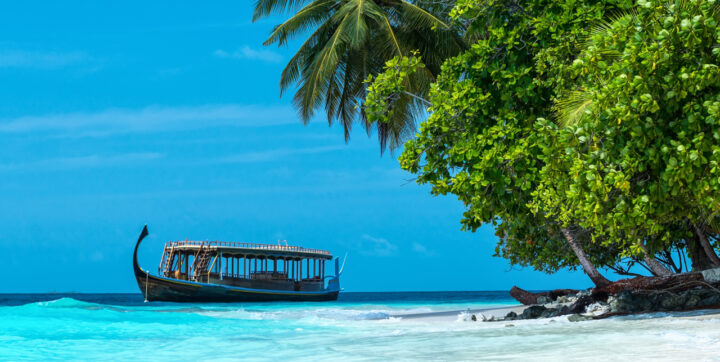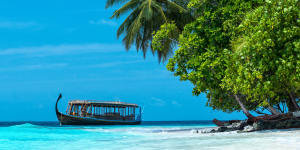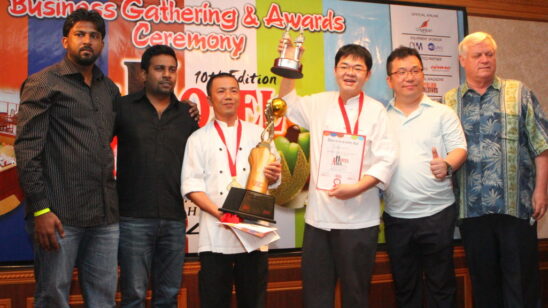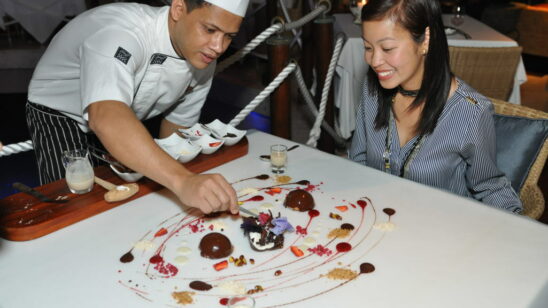
Logistical Obstacles in Resort Paradise
[vc_row][vc_column width=”1/2″][vc_column_text]
Thousand one hundred and ninety small coral islands lay across the middle of the Indian Ocean, also often described as a paradise for sun, sea and sand. These islands belong to the small island Nation of the Maldives, home to some of the world’s most luxurious, extravagant beach resorts and boutique hotels.
Maldives is best known to the world as a luxury tourist destination with a concept of ‘one island one resort’. These resorts are often enjoyed by world-class leaders, celebrities, and by the wealthiest holidaymakers around the globe.
The Maldivian Islands are scattered across an area of 90,000 square kilometers across the Indian Ocean, passing through the equator. Within the past 40 years of tourism development, one of the biggest obstacles faced by Maldivian hospitality industry professionals is the logistics of sourcing and storing fresh food ingredients.
Since Maldives is a low lying garland of tropical Islands surrounded by salt water, a lot of food ingredients which both the locals as well as the tourists consume are imported from all corners of the world.
Within the past two decades, Maldives has managed to scoop up several international awards as one of the best luxury destinations in the whole world. Few decades back, on some world maps it was quite hard to spot Maldives, as the islands were not thoroughly emphasized. However, today, due to our advanced luxury tourism industry, we have managed to be well identified acros s the globe.
s the globe.
Geography and logistics have always been the biggest challenge for our investors, project funders and to the people who manage the projects. Getting goods down to the capital city Male’ via air freight or sea freight is not a tough job, but the transportation of goods from Male’ ports to the final destination has always been a major issue.
Apart from the geography, another major challenge is the lack of a transportation network within the nation. Since resorts are built on isolated little islands, the developers and the managers handle all logistics. As a result of private transportation, the prices of goods further increase.
Also a challenge faced by hoteliers is the drop in standard of the items purchased. Sometimes the goods are transferred in simple boats locally referred to as a “Dhoni.” These boats do not have proper storage compartments unlike in cargo ships. If goods are not properly packed, protected with waterproof packaging, the standard may drop from being directly exposed to salt water. For instance, items such as industrial kitchen cabinets and refrigerators may even be damaged while being transported.
When it comes to perishables such as fresh food ingredients, the challenge is even bigger. Most of the resorts transport their food on a supply boat. Within recent years, tourism has spread to all regions of the Maldives and investors have opened resorts in the northern most and southern atolls of the Maldives.
[/vc_column_text][/vc_column][vc_column width=”1/2″][vc_column_text]
Once again imported purchases such as fresh greens and expensive meat items are transported all the way from the capital city Male’, and by the time these islands in the north and south receive their food items, they are not in acceptable conditions according to international best practice. By the time management receives them, some of it has already been damaged and deviated beyond acceptable ISO or HACCP standards.
One reason for the deviation is the standard of the vessels themselves. Even though every resort has a supply boat, still only few resorts give priority to a good, fully equipped, up to the standards supply boat. Some resorts still use the simple local “Dhoni” and transfer their frozen meat items packed in regiform iceboxes, which is quite risky. If the trip is going to take a few hours, by the time the frozen meat reaches the end destination; it will be thawed and defrosted, especially in our hot tropical climate. This could cause health risks to the consumers.
Distance is not the only issue in our logistical challenges. Although Maldivian islands are well known for their great white sandy beaches, endless turquoise lagoons, there are many obstacles in finding safe harbors for vessels ferrying goods. Still some islands do not have a harbor and unloading of the goods could highly challenging. To this category of islands, its all about the correct timing and tide. If the supply boat reaches the island during low tide, they may have to wait few hours for the tide to rise before they could start unloading the goods. This means, perishable items are sitting on the boat, slowly deviating further away from acceptable standards.
In a country like Maldives, where very few things are grown, running a world-class restaurant is not an easy task. The executive chefs carefully choose each and every ingredient, purchase it from all corners of the world and at the end of the day present it to a fine dining tourist. Keeping the ingredients fresh and at the same time not losing its real taste is one big challenge these professionals face every single day.
However, the most amazing part is, most of the luxury resorts in the Maldives are well known for their extravagant food menus, specialty restaurants and their great signature dishes. While the guests dine and consume the food, one thing which they may never realize is the complexity and the obstacles the management team may have to overcome in order to present the dishes on guests’ tables.
The commitment in keeping the food fresh, commitment for food safety standards and the implementation of best practices are developing well within the industry. More resorts are investing on proper food supply vessels with refrigerated containers for chilled and frozen perishables. We may not be able to overcome the logistical challenges due to geography and nature; however, we are headed towards new technologies and innovative ideas to overcome these obstacles in the future.
In the last decade, new international seaports have been opened both at the North and South of Maldives, and new domestic airports have opened in several atolls of the Maldives. This is definitely going to help the resorts with major logistical challenges presently faced in ferrying fresh produce from Male or the International Airport. This will also further reduce the expenses incurred for the transport of fresh produce to resorts.
[/vc_column_text][/vc_column][/vc_row]






